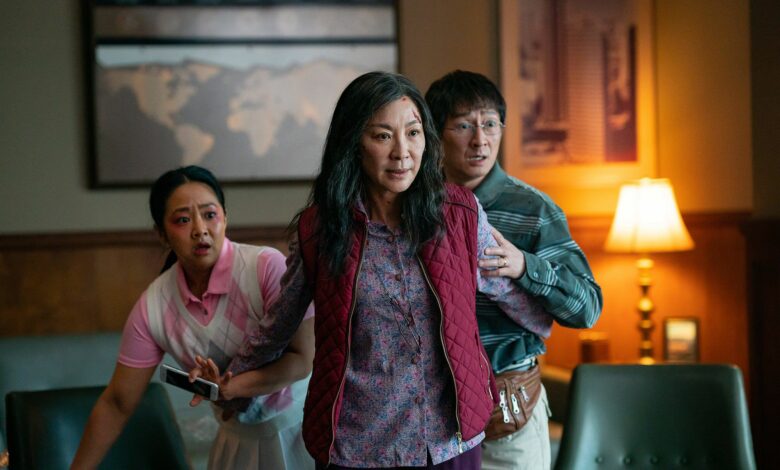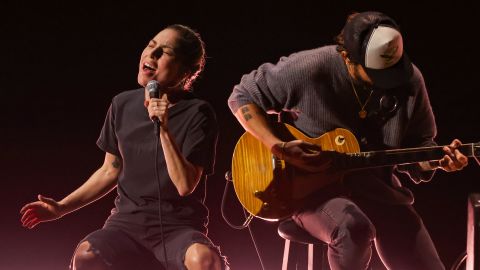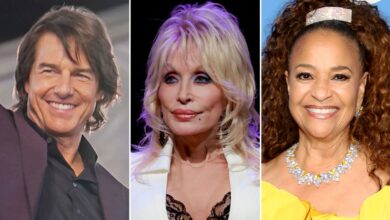
“Everything Everywhere All at Once” was all over the Oscar ceremony, marking a resurgence for theatrical releases in a year that still saw Netflix – as the preeminent streaming option – make its presence felt.
If the Academy wanted a drama-free awards after last year’s incident involving Will Smith and Chris Rock, the group can breathe a sigh of relief over not needing to call upon the services of the crisis-public-relations team that it retained just in case.
What they got, instead, was a frequently heartfelt and moving ceremony, prompting actor Riz Ahmed to observe about an hour into the show, after presenting best documentary to the CNN Films presentation “Navalny,” “It’s an emotional year.”
That it was. “Everything Everywhere” kicked off its big night by sweeping the supporting honors for Jamie Lee Curtis and Key Huy Quan, who both set an enormously high bar for those who followed with their tearful acceptance speeches – Quan calling his win “the American dream,” and Curtis repeating “I just won an Oscar” to all those she wished to thank, including her late parents, Janet Leigh and Tony Curtis, who were both once nominees.
The eccentric science-fiction concept went on to win seven awards, including writing and directing for the team of Daniel Kwan and Daniel Scheinert (known as “Daniels”). That’s the most hardware for any movie since “Gravity” equaled that total in 2009, a tally last exceeded by a best picture winner with “Slumdog Millionaire” 14 years ago.
Without rivaling the year’s major blockbusters, “Everything Everywhere” was a surprise theatrical hit, grossing more than $100 million worldwide, a record for its independent distributor, A24.
More tears flowed when Brendan Fraser was rewarded for his work in “The Whale” (as was the movie’s makeup team), while “Everything Everywhere’s” Michelle Yeoh received her history-making lead actress statuette as an Asian woman from another trailblazer, Halle Berry, kissing her award for good measure.
Becoming the first Black woman to receive two Oscars, “Black Panther: Wakanda Forever” costume designer Ruth E. Carter looked skyward and asked the late Chadwick Boseman to look after her mom, who recently died at the age of 101.
Lady Gaga’s performance of “Hold My Hand” from “Top Gun: Maverick” also featured a dedication to the late Tony Scott, who directed the original, in an evening that maximized its entertainment aspects by putting star-driven musical performances front and center.
Host Jimmy Kimmel set the tone after literally parachuting into the ceremony, delivering an opening monologue that poked fun at the event, last year’s tumultuous moment and the high-profile attendees who were there and (in the case of Tom Cruise and James Cameron) who weren’t, without appearing to be mean spirited.

Still, Kimmel also delivered the night’s most pointed zinger, following the award for editing by saying, “Editors can turn 44,000 hours of violent insurrection footage into a respectful sightseeing tour of the Capitol,” a reference to Fox News host Tucker Carlson’s controversial presentation culled from footage made exclusively available to him by House Speaker Kevin McCarthy.
Although the awards came as Hollywood seeks promote its theatrical business, Netflix reaped the benefits of its investment in movies with seven awards. Four of those – international feature, production design, musical score and cinematography – went to the German remake “All Quiet on the Western Front,” plus best animated film for the stop-motion “Guillermo del Toro’s Pinocchio,” best song for “RRR’s” buoyant “Naatu Naatu,” and documentary short “The Elephant Whisperers.”
The Oscars also reflected the allowances being made to commercial pressures, with what amounted to in-broadcast promotional plugs for Disney’s “The Little Mermaid” and a celebration of Warner Bros.’ history, blurring the line between ads for the industry and the show itself. (CNN is a unit of Warner Bros. Discovery.)
Although the Academy made the crowd-pleasing decision of fully presenting all 23 categories, that helped flummox efforts to streamline a ceremony that ran over 3 ½ hours, prompting Kimmel to quip in closing, “We now join ‘Good Morning America,’ already in progress.”
The “awards season” building toward this year’s 95th Oscars gave every indication “Everything Everywhere All at Once” would emerge with the most-coveted prize, having been recognized by the Independent Spirit Awards and the guilds that represent actors, directors, writers, producers and editors, all constituents of the Academy of Motion Picture Arts and Sciences, which votes on the awards.
This year’s Oscars come as the entertainment industry remains in a state of flux, seeking to recover theatrical audience lost during the pandemic while still building streaming platforms that thrived in terms of adding subscribers with everyone at home, but which are struggling to achieve profitability.
Streaming titles, “CODA” and “Nomadland,” won best picture in the last two cycles, although last year’s outcome was somewhat overshadowed by Smith walking to the stage to slap Rock. Just before the pandemic took hold “Parasite,” the South Korean thriller, became the first non-English-language film to be named best picture.
The major studios are heading into a robust summer of theatrical releases, hoping to build on box-office returns generated by two of this year’s best-picture nominees, the long-delayed sequels “Top Gun: Maverick” and “Avatar: The Way of Water,” each of whose global earnings individually dwarfed those of the other eight contenders combined.
One final takeaway: When it comes to awards, Hollywood’s gratitude to blockbusters only goes so far. “Avatar” and “Top Gun” each received one Oscar on Sunday night, for visual effects and sound, respectively.




